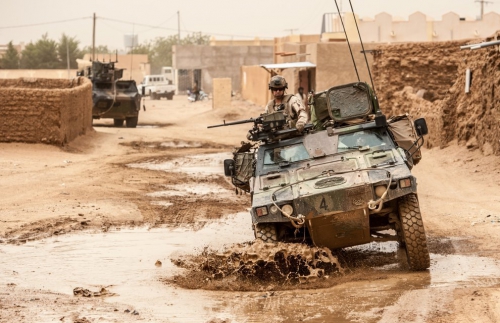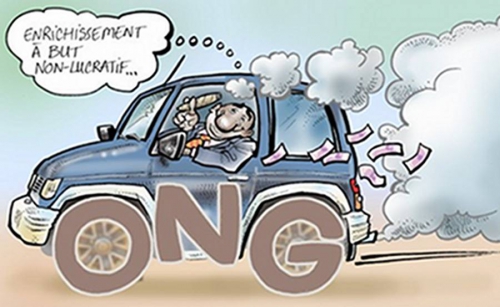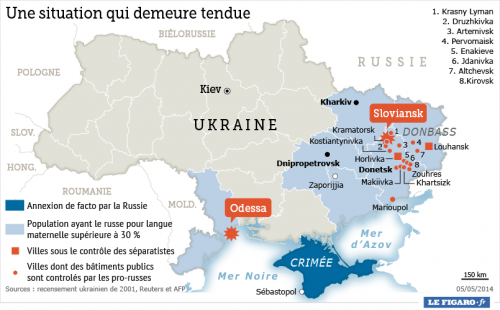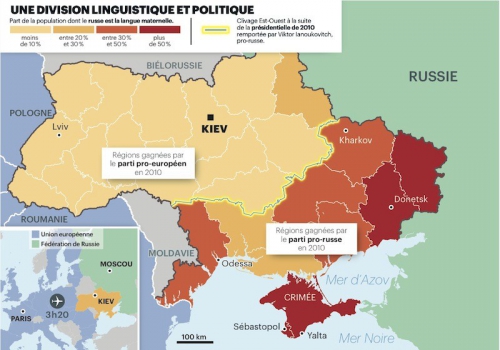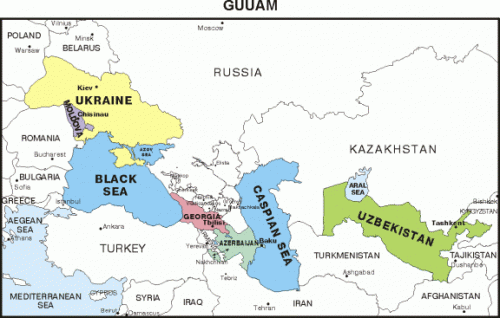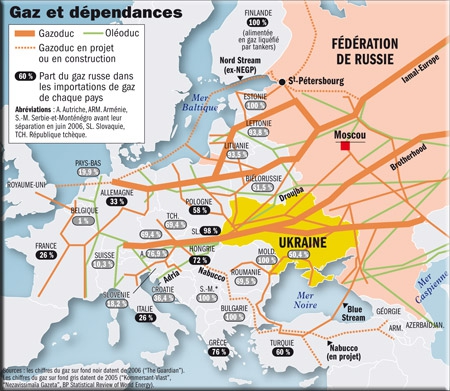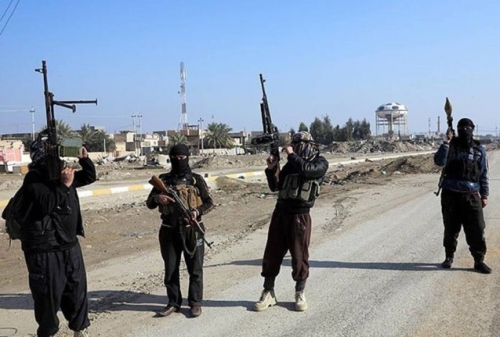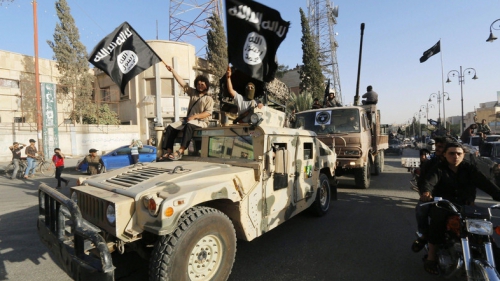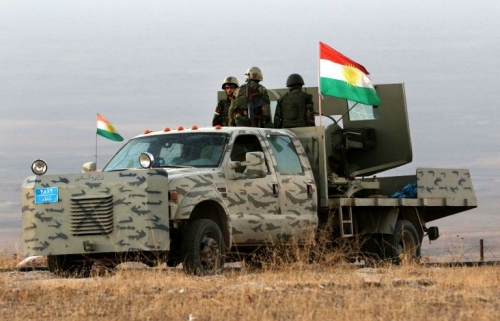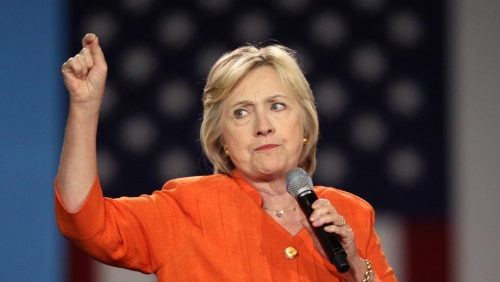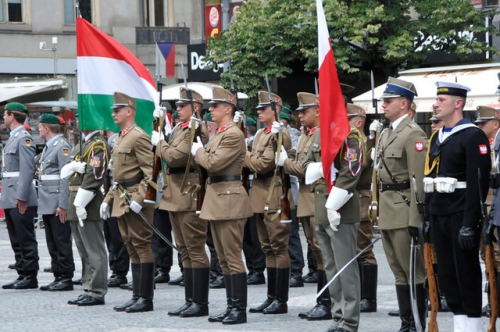L’auteur développe là une analyse unique en son genre, comparant les pratiques de premières frappes préventives des USA et de leurs associés à celles des guerres de course menées par les corsaires et les pirates… il y a seulement quelques siècles. Il y aborde notamment les risques d’une troisième guerre mondiale, le Pape, ISIS, les Baptistes, l’Ukraine, la question kurde…
 Au XVIe siècle, les pirates et les corsaires semaient la terreur sur les mers
Au XVIe siècle, les pirates et les corsaires semaient la terreur sur les mers
Les corsaires étaient des particuliers (souvent des armateurs), qui engageaient des capitaines habiles dans la navigation, pour poursuivre leurs propres intérêts, en collaboration avec les intérêts politiques d’une puissance, qui leur fournissait, justement, une « lettre de course ». Cette lettre les habilitait à attaquer et à piller les vaisseaux d’autres puissances, sous certaines conditions (en général une guerre).
Les activités des pirates et celles des corsaires étaient pratiquement les mêmes. Seules changeaient les couvertures politiques officielles. Certains corsaires finissaient leur carrière comme pirates, parfois pendus par les mêmes gouvernements qui les avaient engagés.
De fait, les corsaires pouvaient se permettre de faire les choses qu’un État considérait comme politiquement ou économiquement imprudent de faire lui-même.
Les Compagnies commerciales constituaient une variante à bien plus grande échelle, et bien plus organisée. Elles étaient dotées de privilèges, comme la célèbre Compagnie anglaise des Indes orientales, qui, quoique totalement privée (la Couronne anglaise ne possédait pas même une action des Compagnies anglaises), jouissait du nihil obstat [1] [l’autorisation donnée par l’autorité compétente, NdT] pour conduire des guerres et des activités de gouvernement.
« Corsaires » et pirates ont suscité les fantaisies romantiques et libertaires de générations de gens qui, par contre, fronçaient le nez devant les entreprises de leurs mandants.
Aujourd’hui, l’histoire se répète, en pire
Depuis plus de 30 ans, les groupes armés des soi-disant fondamentalistes islamiques constituent une forme encore plus perverse de ces grandes compagnies d’aventuriers, au service de l’Empire étatsunien. Les bases de cette alliance-service furent jetées pendant la Première Guerre mondiale par des gens comme St. John Philby [2] et Gertrude Bell [3], brillants agents anglais parfaitement préparés, qui travaillaient en contact étroit avec les princes saoudiens.
On a vu cette alliance à l’œuvre en Afghanistan dans les années 80, sous la savante conduite criminelle de Zbigniew Brzezinski [4], puis en Bosnie, au Kosovo, en Tchétchénie, en Libye, en Syrie et maintenant en Irak. Il est vraisemblable que son bras long s’étendra jusqu’en Inde, via le Pakistan, et jusqu’au Xinjiang ouighour, en Chine.
L’ISIS, c’est-à-dire l’État Islamique de l’Irak et du Levant (Syrie), est la forme la plus sophistiquée de cette stratégie corsaire. Plus encore qu’Israël [5], l’ISIS est la quadrature du cercle : un État-non-État qui, étant par définition une entité terroriste, a le « droit » d’être en dehors de quelque légalité que ce soit. Les USA ont raison, de leur point de vue, de l’appeler « organisation terroriste » : le soutien politique direct, le soutien organisationnel via l’Arabie saoudite, et, justement, cette définition elle-même, constituent la « lettre de course » que la Superpuissance leur fournit. En d’autres termes, ils ont le droit-devoir d’être des terroristes.
Exactement comme c’était le cas des corsaires jadis, sous le déguisement de « combattants de la liberté » (anti-Assad), ils ont suscité les fantaisies romantiques d’humanistes ingénus (parfois, hélas, ils sont même tombés dans la mortelle toile d’araignée) et de soi-disant internationalistes, dont Jupiter avait décidé la perte. Nous pouvons supposer qu’à présent ils se sentent un peu perdus. Nous, au contraire, nous commençons à voir plus clairement les contours d’un dessin assez précis.
La stratégie des premières attaques, analogue à celle des corsaires avec leurs Guerres de course
Dans les années 80 déjà, la Rand Corporation [6] avait « prévu » que les guerres futures seraient un mixte de conflits stellaires et de conflits prémodernes menés par des entités infra-étatiques. Prévision aisée à faire, puisque la Rand faisait partie du complexe qui était en train de préparer ce scénario.
Cette stratégie s’appuie sur une parfaite logique. En fait, les « guerres des étoiles », menées jusqu’à leurs dernières conséquences, ne peuvent que se transformer en conflits nucléaires. Par contre, la guerre de course, par l’intermédiaire d’entités infra-étatiques, conduite par les USA, après les premiers coups « orthodoxes » portés par l’engeance des Bush et Clinton, a permis à la Superpuissance de lancer cette série de premières attaques (first strikes), qui auraient été très risqués, et donc impossibles, sous forme de guerres orthodoxes entre États, même si la nouvelle attitude nucléaire (New Nuclear Posture [7]) élaborée par les néo-cons sous Bush Jr. ne les excluait pas.
La débandade initiale des rivaux stratégiques démontre qu’il y avait là un coup de génie, évidemment criminel. On a même l’impression que ces rivaux préfèrent courir le risque de guerres terroristes infra-étatiques plutôt que celui d’un conflit ouvert avec un adversaire sans scrupules, et de plus en plus agressif, parce que de plus en plus en difficulté. Une difficulté toutefois relative, que nous chercherons à préciser.
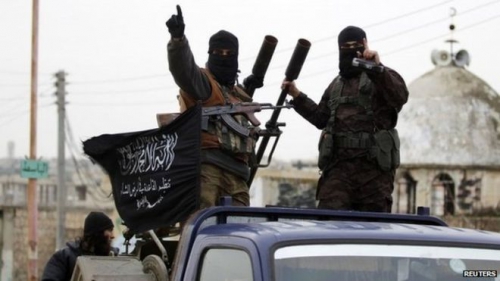
Un État-non-État à l’abri de son drapeau noir de pirate
Qu’y a-t-il de mieux pour les USA que d’installer dans le centre névralgique de l’Eurasie (déjà objet des cauchemars et des désirs du conseiller de Carter pour la sécurité, le « prophétique » Zbigniew Brzezinski) un État-non- État, un État-zombie, un être-non-être, une organisation territoriale qui, à l’abri de son drapeau noir de pirate, peut menacer d’actions effroyables tous les États voisins, depuis la Syrie, la Russie, l’Iran, la Chine, les républiques centre-asiatiques, puis, tout au long du corridor qui, à travers du Pakistan, pénètre en Inde et qui, à travers le Xinjiang ouighour, prend la Chine à revers ? Difficile d’imaginer meilleure arme non conventionnelle. Très difficile. C’est un terrible pieu planté au beau milieu de l’Organisation de coopération de Shanghaï.
Mais ce n’est pas tout : même l’Europe peut être menacée (cela n’a-t-il pas déjà été fait ?). Cela peut être utile, si elle se montrait trop récalcitrante face au projet néo-impérialiste états-unien, avec des annexes et des connexions du type du criminel Traité transatlantique de libre-échange (TTIP).
La difficulté où se trouveraient, disions-nous, les USA, ne réside pas dans un éventuel déclin inexorable du pays, selon on ne sait quelles lois géopolitiques ou économiques. En réalité, la difficulté réside dans le système capitaliste même, qui est aujourd’hui encore centré sur les USA, ce qu’on ne peut contester que si l’on pense que le système capitaliste est mesurable en termes de profits, Produit intérieur brut, échanges commerciaux et réserves de devises. Cela compte aussi, mais pas uniquement, parce que le système capitaliste est un système de pouvoir.
De plus, les puissances émergentes ont émergé, pour ainsi dire, « en retard » (il ne pouvait en être autrement), c’est-à-dire que les capacités destructrices militaires, industrielles, écologiques et financières mondiales ont déjà été massivement hypothéquées par un État-continent appelé États-Unis d’Amérique et par ses vassaux. Il est vrai que nous, pays capitalistes occidentaux à capitalisme mûr, ne comptons que pour 1/7e de la population mondiale, mais c’est justement ce qui donne l’inquiétante mesure du problème, puisque nous comptons immensément plus pour ce qui est de la capacité destructrice.
Une totale absence de scrupules
Le réalisateur Oliver Stone et l’historien Peter Kuznick ont fait remarquer, avec beaucoup d’acuité, qu’avec Hiroshima et Nagasaki, les USA ne voulaient pas seulement démontrer qu’ils étaient surpuissants, mais aussi (ce qui encore plus préoccupant) qu’ils n’auraient aucun scrupule dans la défense de leurs intérêts propres : ils étaient prêts à réduire massivement en cendres hommes, femmes et enfants.
Les populations libyennes, syriennes et irakiennes, martyrisées par les corsaires fondamentalistes, sont l’effroyable démonstration de cette absence de scrupules : ces épisodes de génocides par étapes sont accomplis en lieu et place de l’unique extermination nucléaire, jugée trop risquée. Dans ce sens précis, l’ISIS est utilisée comme une arme de destruction massive échelonnée.
En Occident, cette stratégie reste incompréhensible pour la plupart des gens
Il est vrai qu’elle est complexe, parce qu’elle se fonde sur un jeu complexe d’intérêts différenciés, depuis des intérêts purement idéologiques jusqu’à des intérêts purement maffieux. Cela n’en reste pas moins surprenant, parce que, outre que cette stratégie est désormais claire dans ses objectifs (évidemment parce que les USA eux-mêmes les ont éclaircis), elle est, comme on l’a vu, la réédition d’une stratégie connue et bien connue.
Sa perception pouvait être confuse pendant le conflit afghan des années 80. Il pouvait alors être difficile de comprendre la connexion entre choc des cultures, invasion soviétique et naissance de la guérilla islamiste, soutenue et organisée par les USA. Pourtant, certains chercheurs, en petit nombre, il est vrai, et traités comme des excentriques, avaient déjà fait remarquer les connexions entre crise systémique, reaganomics [8], financiarisation, conflits géopolitiques, et la reprise d’initiative néo-impériale des USA après la défaite au Vietnam (combien de fois a-t-on présenté les USA comme fichus !). Je veux parler des chercheurs regroupés dans l’école du « système-monde ».
Il est en tout cas curieux qu’une gauche aussi déterminée dans les années 60 et 70 à lutter pour la défense du prosoviétique Vietnam se soit retrouvée, très peu d’années après, à faire des clins d’œil aux fondamentalistes soutenus par les USA contre une Union soviétique maintenant considérée comme l’Empire à détruire à tout prix.
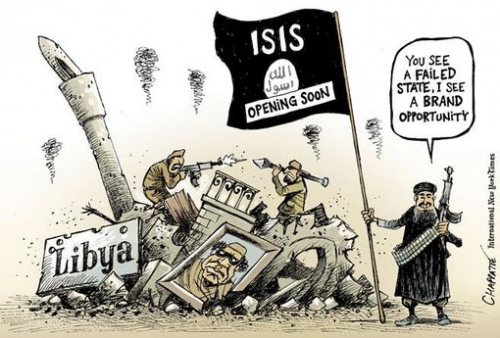
Les ex-militants de gauche sont devenus des supporters de la nouvelle politique impériale
Avec les Tours jumelles, début de la Troisième Guerre Mondiale par zones dont parle même aujourd’hui le Pape (a-t-il vraiment fallu 13 ans au Vatican pour le comprendre ?), la dérive totale de la gauche était pré-annoncée par un spectaculaire chant du cygne : les énormes manifestations contre les guerres de Bush Jr. et les politiques néo-libérales globalisées. On était sur la bonne voie, car c’étaient là exactement les deux aspects complémentaires du mariage entre argent et pouvoir, mis à nu par la crise systémique. Et pourtant, il a suffi de l’approfondissement de cette crise et de son irruption dans les centres capitalistes occidentaux, puis de l’élection sanctifiée de Barack Hussein Obama, pour faire dérailler tout raisonnement : et des centaines de milliers d’ex-militants ont été transformés en supporters actifs, passifs ou inconscients de la nouvelle politique impériale. Ce n’est pas une exagération : il suffit de comparer les 3 millions de personnes dans la rue à Rome en 2003 contre la guerre contre l’Irak et les 300 (trois cents !) personnes dans la rue à Rome en 2011 contre la guerre contre la Libye.
Mais le pire, c’est que ce n’est pas le résultat d’un programme de conditionnement sophistiqué ! C’est le succès des stratégies de communication introduites en leur temps par le Nazi Goebbels, redistribuées à travers les vieux et les nouveaux médias, avec une variante décisive : non seulement des mensonges gros comme des maisons répétés partout à l’unisson et par tous les médias, mais, en plus, assaisonnés avec les termes et les concepts qui plaisent le plus à la gauche. Si lancer des bombes fait froncer le nez, il suffit de dire qu’elles sont intelligentes ou même humanitaires, voire qu’elles constituent tout bonnement des aides humanitaires.
L’Empire parle alors un langage d’un registre étendu, depuis le registre réactionnaire, jusqu’au registre du progrès technique, social et politique. Ce n’est pas vraiment une nouveauté, mais sa cible est une société en voie de désarticulation, à cause de la crise toujours plus féroce, abandonnée et même trahie par les intellectuels et les politiciens auxquels elle s’était confiée, et où, hélas, même dans les quelques bastions de résistance qui restent, les effets mutagènes du langage impérial exercent leurs ravages.
Comme le commenta alors [2011] une vignette d’Altan [Dessinateur humoriste italien, NdT], il y a un truc, cela se voit parfaitement, mais tout le monde s’en fiche. Les raisons devraient en être étudiées de façon beaucoup plus approfondie que dans les rapides propositions qui précèdent, pour comprendre comment on peut sortir de ces limbes suspendus au-dessus du gouffre.
De toute façon, la « guerre contre le terrorisme » n’a abattu aucun terrorisme, parce qu’il n’y avait aucun terrorisme à abattre. En revanche, elle a détruit des États, d’abord l’Afghanistan, puis l’Irak.
Entre temps, le terrorisme est entré en sommeil, et n’est réapparu que pour donner quelques nécessaires preuves de vie, à Madrid et Londres, au cœur de l’Europe. En réalité, il était en phase de réorganisation, dans le sens où on était en train de le réorganiser pour les nouveaux théâtres d’opérations, peut-être, au début, pas encore très clairs dans l’esprit des stratèges états-uniens parce que, dans les crises systémiques, même celui qui génère et utilise le chaos en ressent les conséquences.

La gauche a déployé une stupéfiante capacité à ne rien comprendre
Avec Obama, les objectifs et la stratégie s’éclaircissent progressivement. Une fois la nouvelle armée corsaire réorganisée et montée en puissance, éclate la nouvelle offensive, moyennant deux préludes : le discours d’Obama à l’Université du Caire en 2009 et les « printemps arabes » commencés l’année suivante.
Dans les deux cas, la gauche a déployé une stupéfiante capacité à ne rien comprendre. Ayant désormais complètement séparé l’anticapitalisme de l’antiimpérialisme, la plus grande partie du « peuple de gauche » s’est laissé envelopper dans la mélasse du couple « bonnes intentions-droits humanitaires » [… ], élevant n’importe quel bla-bla au rang de concept, puis de Verbe. Il suffit qu’Obama parle, et on s’écrie en chœur : que c’est beau ! Quelle différence entre Obama et ce belliciste antimusulman de Bush ! Vous avez entendu ce qu’il a dit au Caire ?
Pas le plus léger soupçon que l’Empire est en train d’exposer sa nouvelle doctrine d’alliance avec l’Islam politique (alliance qui a son centre logistique, financier et organisationnel en Arabie saoudite, le partisan le plus fidèle et le plus ancien des USA au Moyen-Orient).
C’est encore pire avec les « printemps arabes »
Même alors que les bombardements sur la Libye ont commencé, la gauche n’a pas le bon sens de réviser son enthousiasme pour ces « révoltes ». Paradigmatique fut le démentiel et déplaisant appel de Rossana Rossanda [9] à s’enrôler dans les rangs des égorgeurs de Benghazi (dont le chef venait directement de Guantanamo, avec couverture de l’Otan), « comme les antifascistes l’avaient fait en Espagne ». Cet appel était le signe de la corruption aristotélicienne, non pas d’un cerveau de vieillard, mais de plusieurs générations de rêveurs ayant grandi sous le ciel de l’empire américain, naturel comme le firmament, et invisible comme le temps, donc non perceptible. Sous cette coupole étoilée et globalisée, le capitalisme devenait non plus un rapport social vivant dans une société et des lieux géographiques matériels, mais un simple concept qui s’opposait à un autre concept, celui du capital à celui du travail. Rien de moins matérialiste depuis les temps des discussions sur le sexe des anges.
Désaccoupler le capitalisme de l’impérialisme c’est comme prétendre dissocier l’hydrogène de l’oxygène, tout en voulant en même temps conserver l’eau. Pour un chrétien, c’est comme dissocier le Christ du Saint-Esprit : il en reste quelque chose, qui hésite entre l’érudition livresque et les bons sentiments instinctifs, livré comme une proie à tout démon fourbe et déterminé.
On est arrivé au point qu’un chef d’état-major étatsunien, le général Wesley Clark, révèle que la Libye et la Syrie étaient déjà en 2001 sur une liste d’objectifs sélectionné par le Pentagone, et que de soi-disant marxistes continuent, tranquillement, à croire à des « révoltes populaires », ces révoltes populaires qu’eux-mêmes n’ont pas été et ne sont pas capables de susciter dans leur propre pays. Bref, ce sont là les effets de crises d’abstinence.
Le Mouvement 5 étoiles et Sinistra Ecologia Libertà, apportent un peu de lucidité en Italie
Mais ce sont là désormais des détails résiduels, qui concernent des résidus historiques, privés de valeur politique. Ils servent tout au plus à illustrer le bien plus grave phénomène de toute une gauche confrontée à la Troisième Guerre Mondiale, et qui y arrive dans un état d’impréparation totale, sur les plans théorique, politique et idéologique. Elle est plus désarmée que le « peuple de droite », et souvent se range ouvertement dans le camp des bellicistes.
Ah ! Pasolini, comme tu avais raison de tonner contre les « irresponsables intellectuels de gauche » ! Jusqu’où sommes-nous arrivés !
Il n’y a qu’un petit rayon dans cet été si nuageux. On ne peut qu’être d’accord avec le Mouvement 5 étoiles [10] et le Sinistra Ecologia Libertà [11] sur leur opposition à l’envoi d’armes aux Kurdes (d’ailleurs à quels Kurdes ?). Divers raisonnements s’unissent ici, comme l’indécence d’exporter des armes et l’inutilité de la chose pour résoudre le conflit. Mais la vraie inutilité et l’indécence résident dans le fait que ce conflit est un jeu à somme nulle, dans lequel se trouveront prises des milliers de personnes, à 90 % des civils, comme c’est le cas dans tous les conflits modernes, et comme nous en avertissent des organisations comme Emergency.
Les preuves de ces forfaitures sont là, il suffit de les regarder
Le sénateur John McCain, en apparence franc-tireur, mais en réalité agent plénipotentiaire de la politique de chaos terroriste d’Obama, s’est mis d’accord aussi bien avec les leaders du Gouvernement régional kurde en Irak qu’avec le Calife de l’ISIS, Abu Bakr al- Baghdadi, ex Abu Du’a, ex Ibrahim al-Badri, un des cinq terroristes les plus recherchés par les USA, avec une récompense de 10 millions de dollars.
Il y a des témoignages et des preuves photographiques. Et c’est sur ces photos que se fonde la dénonciation devant l’autorité judiciaire, présentée par leurs familles, du sénateur McCain comme complice de l’enlèvement au Liban, par l’ISIS, de plusieurs personnes.
De même que Mussolini avait besoin d’un millier de morts à jeter sur la table des négociations de paix, les USA, l’ISIS et les dirigeants kurdo-irakiens ont besoin de quelques milliers de morts (civils) à jeter sur la scène de la tragédie moyen-orientale, afin de mener à bien la tripartition de l’Irak et le vol de zones du nord-est de la Syrie (ce qui est le contraire d’une union contre les terroristes de la Syrie et des USA, comme l’écrivent des voyous frivoles dont la plume est vendue au régime). Le tout au bénéfice du réalisme du spectacle.
[…]
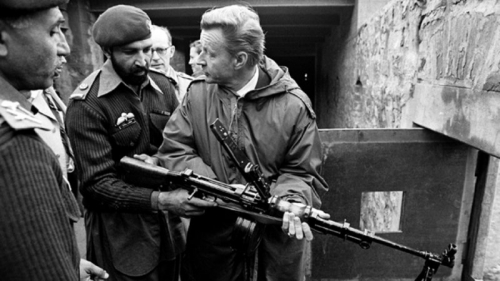
En 1979, Zbigniew Brzezinski avait compris et écrit que le futur problème des USA était l’Eurasie et qu’il fallait donc la balkaniser, en particulier la Russie et la Chine.
Au début du siècle passé, en pleine hégémonie mondiale de l’Empire britannique, le géographe anglais Halford Mackinder [12] écrivait « Qui contrôle l’est de l’Europe commande le Heartland, qui contrôle le Heartland commande l’Ile-Monde, qui contrôle L’Ile-Monde commande le monde ».
Les infatigables déambulations de McCain entre Ukraine et Moyen-Orient ne sont donc pas un hasard. La pensée dominante est toujours la même. Ce qui a changé, c’est que les USA ont compris qu’il n’est pas nécessaire que ce soit ses propres troupes qui fassent tout le sale boulot.
Piotr | 25 Août 2014
[1] Nihil obstat est une locution latine signifiant proprement « rien ne s’oppose ».
[2] Harry St. John Bridger Philby (né le 3 avril 1885 à Badulla, Ceylan – mort le 30 septembre 1960 à Beyrouth, Liban), également connu sous les noms de Jack Philby ou Sheikh Abdullah (الشيخ عبدالله), fut espion britannique, explorateur, écrivain, et ornithologue (wikipedia, français).
[3] Gertrude Margaret Lowthian Bell, née le 14 juillet 1868 à Washington Hall dans le comté de Durham en Angleterre et décédée le 12 juillet 1926 à Bagdad, était une femme de lettres, analyste politique, archéologue, alpiniste, espionne et fonctionnaire britannique (wikipedia, français).
[4] Zbigniew Kazimierz Brzeziński (né le 28 mars 1928 à Varsovie en Pologne) est un politologue américain d’origine polonaise. Il a été conseiller à la sécurité nationale du Président des États-Unis Jimmy Carter, de 1977 à 1981 (wikipedia, français). Il est l’auteur du fameux livre Le grand échiquier (les-crises.fr, français).
[5] Étant formellement un État internationalement reconnu, Israël doit se soumettre à la légalité internationale, même s’il ne le fait pratiquement jamais (il se prévaut de larges dérogations), et il a une organisation politico-institutionnelle complexe (mais celle-ci compte de moins en moins, comme chez nous [en Europe, NdT]).
[6] La RAND Corporation, fondée en 1945, est une institution américaine à but non lucratif qui a pour objectif d’améliorer la politique et le processus décisionnel par la recherche et l’analyse (wikipedia, français).
[7] A New Nuclear Posture (armscontrol.org, anglais, 05-2010)
[8] Le terme de Reaganomics, mot-valise de « Reagan » et « economics » se réfère aux politiques en matière d’économie du président américain Ronald Reagan. Ses quatre piliers furent d’augmenter les dépenses du gouvernement, notamment militaires, de réduire les impôts sur le revenu du travail et du capital, de réduire la régulation, et de contrôler l’argent utilisé pour réduire l’inflation (wikipedia, français).
[9] Rossana Rossanda (Pola, aujourd’hui en Croatie, 23 avril 1924), est une journaliste et une femme politique italienne, dirigeante du Parti communiste italien dans les années 1950 et 1960 (wikipedia, français).
[10] Le Mouvement 5 étoiles (en italien, Movimento 5 Stelle ou Cinque Stelle, M5S) est un mouvement politique italien qui se qualifie d’« association libre de citoyens » (wikipedia, français).
[11] Gauche, écologie et liberté, un des petits partis à gauche de la gauche (wikipedia, français).
[12] Halford John Mackinder (15 février 1861 – 6 mars 1947) est un géographe et géopoliticien britannique. D’après sa théorie du Heartland, on observerait ainsi la planète comme une totalité sur laquelle se distinguerait d’une « île mondiale », Heartland (pour 2/12e de la Terre, composée des continents eurasiatique et africain), des « îles périphériques », les Outlyings Islands (pour 1/12e, l’Amérique, l’Australie), au sein d’un « océan mondial » (pour 9/12e). Il estime que pour dominer le monde, il faut tenir ce heartland, principalement la plaine s’étendant de l’Europe centrale à la Sibérie occidentale, qui rayonne sur la mer Méditerranée, le Moyen-Orient, l’Asie du Sud et la Chine (wikipedia, français).
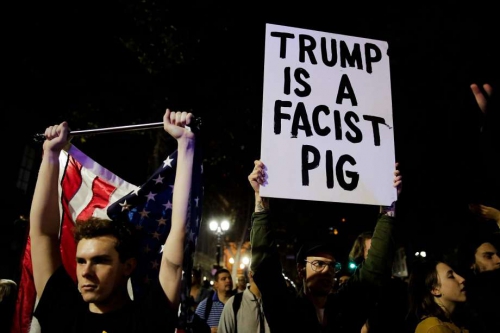





 del.icio.us
del.icio.us
 Digg
Digg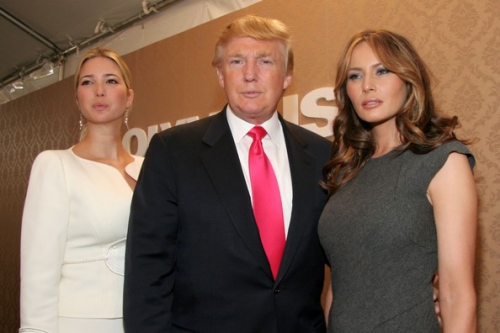
 Face à Clinton donc, mais face aussi aux caciques du parti républicain qui l’ont attaqué à chaque prétendu dérapage, Paul Ryan et John McCain en tête, alors qu’il était désavoué par les Bush et combattu par les néo-conservateurs, et que même Schwarzenegger s’est dégonflé, ne bénéficiant dès lors que du soutien explicite de Clint Eastwood et de Steven Seagal, et du soutien implicite des Stallone, Willis, Norris et autres acteurs des films d’action, il a vaincu. Il a remporté les primaires, humiliant les Kasich et les Jeb Bush. Il a su obtenir le ralliement de Ted Cruz, son adversaire le plus déterminé mais qui, une fois vaincu, s’est montré ensuite d’un soutien sans faille. Il a su conserver le soutien aussi de Priebus, le président du parti républicain, face aux manœuvres des Romney et Ryan qui voulaient au mépris du vote des citoyens le renverser.
Face à Clinton donc, mais face aussi aux caciques du parti républicain qui l’ont attaqué à chaque prétendu dérapage, Paul Ryan et John McCain en tête, alors qu’il était désavoué par les Bush et combattu par les néo-conservateurs, et que même Schwarzenegger s’est dégonflé, ne bénéficiant dès lors que du soutien explicite de Clint Eastwood et de Steven Seagal, et du soutien implicite des Stallone, Willis, Norris et autres acteurs des films d’action, il a vaincu. Il a remporté les primaires, humiliant les Kasich et les Jeb Bush. Il a su obtenir le ralliement de Ted Cruz, son adversaire le plus déterminé mais qui, une fois vaincu, s’est montré ensuite d’un soutien sans faille. Il a su conserver le soutien aussi de Priebus, le président du parti républicain, face aux manœuvres des Romney et Ryan qui voulaient au mépris du vote des citoyens le renverser.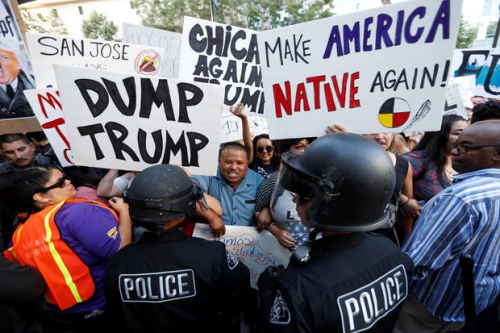


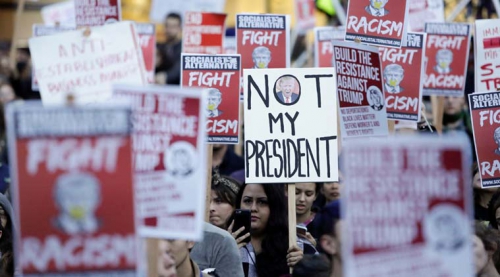
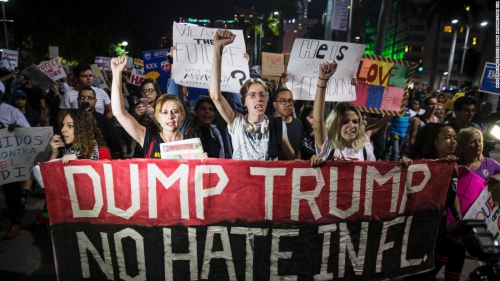
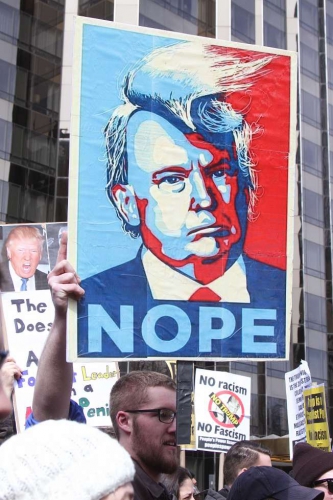 Hillary is the tool, enriched by the Oligarchy, whose job as President was to protect and to increase the trillion dollar budget of the military/security complex. With Hillary in the White House, the looting of the American taxpayers in behalf of the wealth of the One Percent could go forward unimpeded. But if Trump resolves “the Russian threat,” the Oligarchy takes an income hit.
Hillary is the tool, enriched by the Oligarchy, whose job as President was to protect and to increase the trillion dollar budget of the military/security complex. With Hillary in the White House, the looting of the American taxpayers in behalf of the wealth of the One Percent could go forward unimpeded. But if Trump resolves “the Russian threat,” the Oligarchy takes an income hit.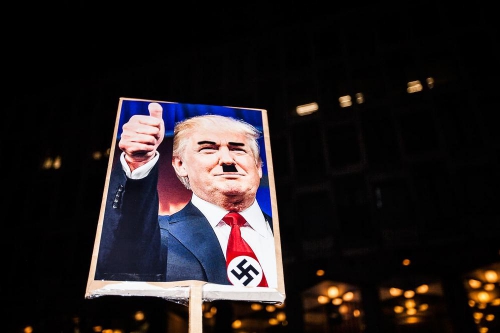


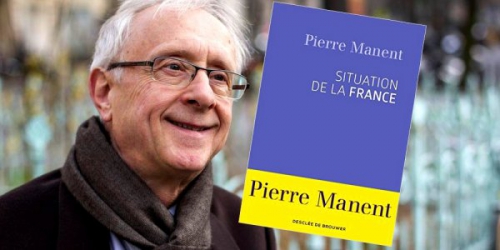

 Manent se garde bien de postuler une ontologie du musulman, comme il l’écrit : « il ne s’agit pas de postuler une essence immuable de l’islam, seulement de reconnaître son existence et pour ainsi dire sa consistance (…). Notre régime politique et nos mœurs nous incitent à ramener les masses spirituelles aux individus qui les composent, mais enfin, aussi désireux que nous soyons de ne voir partout que des sujets titulaires de droits et des individus cherchant leur intérêt, nous nous heurtons à quelques grands faits collectifs qui sont déterminants pour la vie du monde. Nous nous y heurtons chaque jour davantage. Qui a peur du scandale trébuchera sur la pierre du scandale »[3]. Par ailleurs, il constate avec raison la négligence des gouvernants quant aux masses spirituelles, aveuglés qu’ils sont par l’individualisme libéral-libertaire du toujours plus de droits. Toutefois, sa réponse ne nous paraît pas souhaitable. Si nous sommes d’accord pour dire que les humiliations sont vexatoires et inutiles, autoriser les menus confessionnels, les horaires réservés et autres « accommodements raisonnables » comme on dit dans la Belle Province revient à rompre de fait l’égalité républicaine (rien à voir avec l’égalitarisme socialiste). Le groupe social musulman est composé de citoyens égaux en dignité et en droits aux autres. Il n’a pas a bénéficier de règlements spécifiques. D’une part, la population musulmane en métropole n’en a jamais eu besoin avant la lâcheté de Jospin en 1989, quand ce dernier s’est défaussé devant l’entrisme intégriste à Creil, et d’autre part, étant de peuplement récent en France (majoritairement arrivée à partir du regroupement familial dans les années 1970), elle doit s’adapter au pays qui l’accueille et dont elle a choisi de prendre la nationalité.
Manent se garde bien de postuler une ontologie du musulman, comme il l’écrit : « il ne s’agit pas de postuler une essence immuable de l’islam, seulement de reconnaître son existence et pour ainsi dire sa consistance (…). Notre régime politique et nos mœurs nous incitent à ramener les masses spirituelles aux individus qui les composent, mais enfin, aussi désireux que nous soyons de ne voir partout que des sujets titulaires de droits et des individus cherchant leur intérêt, nous nous heurtons à quelques grands faits collectifs qui sont déterminants pour la vie du monde. Nous nous y heurtons chaque jour davantage. Qui a peur du scandale trébuchera sur la pierre du scandale »[3]. Par ailleurs, il constate avec raison la négligence des gouvernants quant aux masses spirituelles, aveuglés qu’ils sont par l’individualisme libéral-libertaire du toujours plus de droits. Toutefois, sa réponse ne nous paraît pas souhaitable. Si nous sommes d’accord pour dire que les humiliations sont vexatoires et inutiles, autoriser les menus confessionnels, les horaires réservés et autres « accommodements raisonnables » comme on dit dans la Belle Province revient à rompre de fait l’égalité républicaine (rien à voir avec l’égalitarisme socialiste). Le groupe social musulman est composé de citoyens égaux en dignité et en droits aux autres. Il n’a pas a bénéficier de règlements spécifiques. D’une part, la population musulmane en métropole n’en a jamais eu besoin avant la lâcheté de Jospin en 1989, quand ce dernier s’est défaussé devant l’entrisme intégriste à Creil, et d’autre part, étant de peuplement récent en France (majoritairement arrivée à partir du regroupement familial dans les années 1970), elle doit s’adapter au pays qui l’accueille et dont elle a choisi de prendre la nationalité. 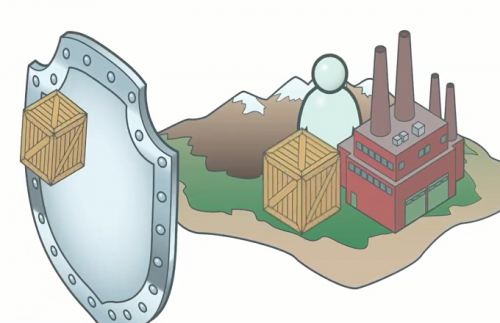
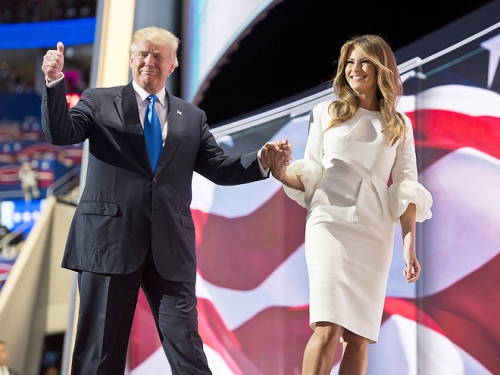
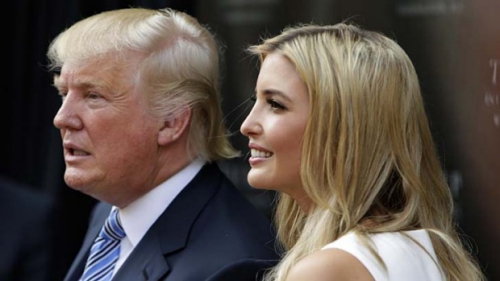 Trump peut déjà être crédité d’un immense succès : sa campagne a contraint les médias dominants étasuniens à montrer leur vrai visage – le visage d’une machine de propagande mauvaise, menteuse et moralement corrompue. Par son vote, le peuple américain a récompensé ses médias avec un gigantesque «Allez vous faire foutre !», un vote de défiance et de rejet total, qui détruira à jamais la crédibilité de la machine de propagande de l’Empire.
Trump peut déjà être crédité d’un immense succès : sa campagne a contraint les médias dominants étasuniens à montrer leur vrai visage – le visage d’une machine de propagande mauvaise, menteuse et moralement corrompue. Par son vote, le peuple américain a récompensé ses médias avec un gigantesque «Allez vous faire foutre !», un vote de défiance et de rejet total, qui détruira à jamais la crédibilité de la machine de propagande de l’Empire.

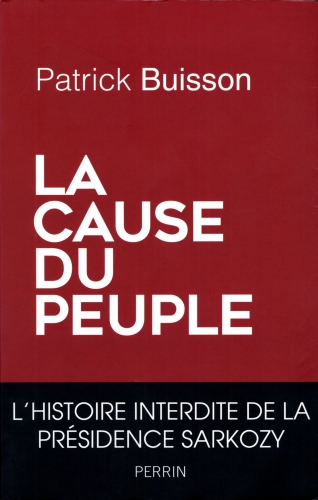
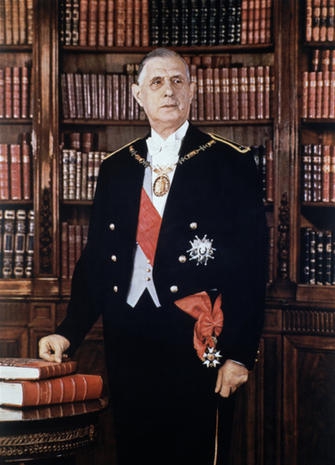
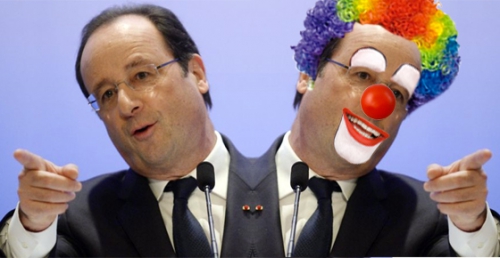


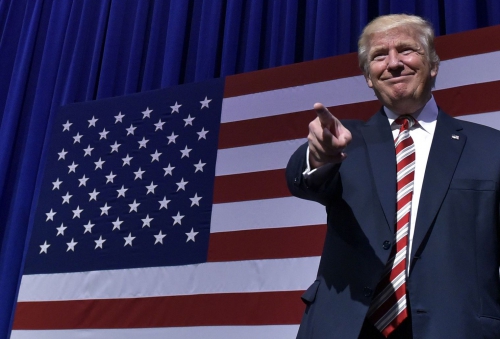

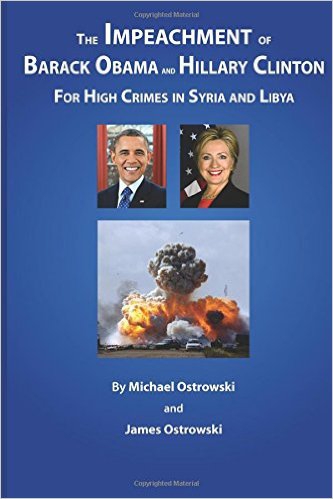 What happened in Libya and Syria is simply a manifestation of a very dangerous mindset known as progressivism. Progressivism amounts to a blind faith that government force can improve any given situation. It is usually associated with domestic policy but progressivism also operates in foreign policy. Progressives ignore costs and consequences. Progressives plunge into situations they do not understand, heedless of the consequences. When progressives fail, they invariably attribute the failure to not using enough government force. Thus, Obama, explaining his failure in Libya, stated, “I think we underestimated... the need to come in full force.”
What happened in Libya and Syria is simply a manifestation of a very dangerous mindset known as progressivism. Progressivism amounts to a blind faith that government force can improve any given situation. It is usually associated with domestic policy but progressivism also operates in foreign policy. Progressives ignore costs and consequences. Progressives plunge into situations they do not understand, heedless of the consequences. When progressives fail, they invariably attribute the failure to not using enough government force. Thus, Obama, explaining his failure in Libya, stated, “I think we underestimated... the need to come in full force.”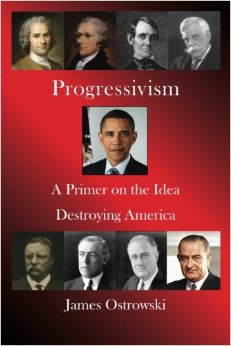 Second, people in foreign lands have never approved in any way the progressives’ intervention into their own country. Third, that being the case, while domestic intervention has a number of tools at its disposal, foreign intervention has only one primary tool, war. War involves killing people and destroying property. Not only does this directly engender resistance and retaliation but it also strips away the protective coating of propaganda that usually cloaks state action. For example, since most people comply with tax laws, the state only rarely has to use actual force to collect them. Thus, the violent nature of taxation is hidden underneath the usual avalanche of birth-to-death progressive propaganda. For example, it is based on voluntary compliance; it is the citizens’ duty, and it’s all good because it was democratically approved. While all these rationalizations are nonsense, it is not easy to cut through the propaganda when the audience spent twelve years in a government school being brainwashed. In sharp contrast, when a bomb blows up an apartment building and kills thirty people, the facts are plain and the ability of propaganda to make people think that black is white, is minimal. Naturally, they tend to react, resist and retaliate.
Second, people in foreign lands have never approved in any way the progressives’ intervention into their own country. Third, that being the case, while domestic intervention has a number of tools at its disposal, foreign intervention has only one primary tool, war. War involves killing people and destroying property. Not only does this directly engender resistance and retaliation but it also strips away the protective coating of propaganda that usually cloaks state action. For example, since most people comply with tax laws, the state only rarely has to use actual force to collect them. Thus, the violent nature of taxation is hidden underneath the usual avalanche of birth-to-death progressive propaganda. For example, it is based on voluntary compliance; it is the citizens’ duty, and it’s all good because it was democratically approved. While all these rationalizations are nonsense, it is not easy to cut through the propaganda when the audience spent twelve years in a government school being brainwashed. In sharp contrast, when a bomb blows up an apartment building and kills thirty people, the facts are plain and the ability of propaganda to make people think that black is white, is minimal. Naturally, they tend to react, resist and retaliate.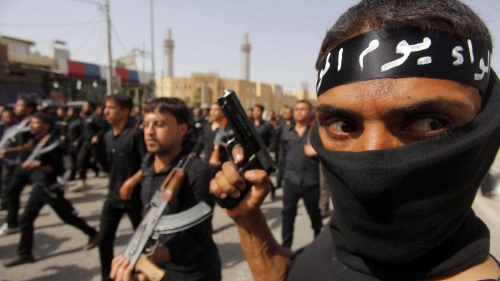





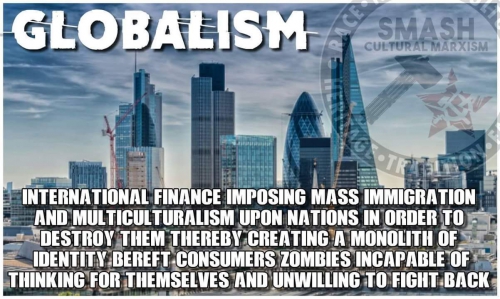






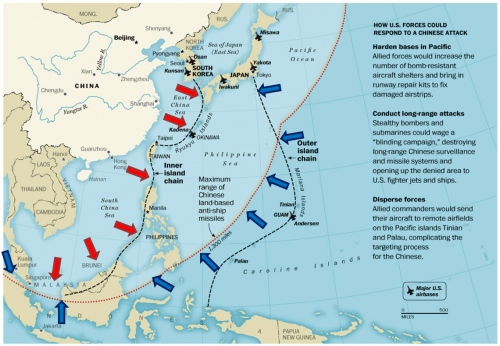
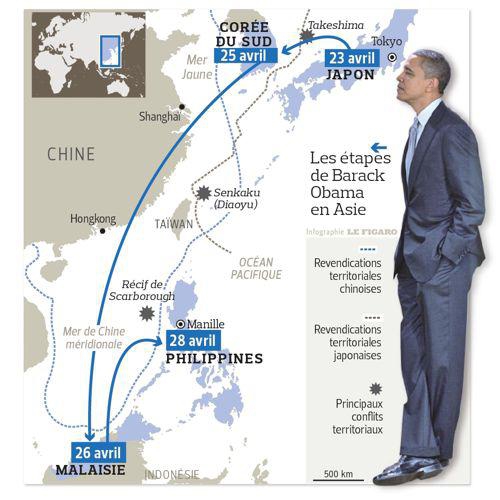
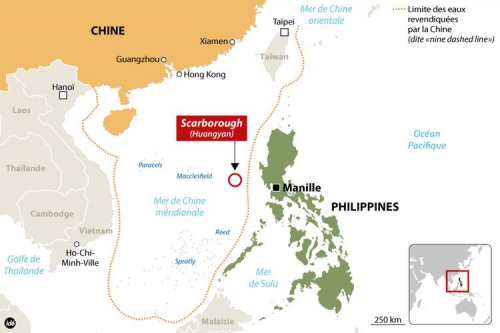

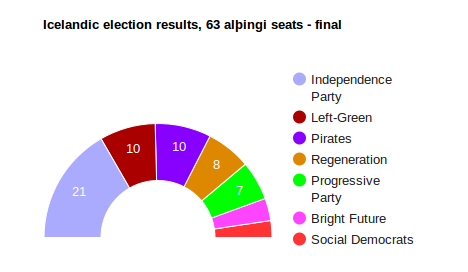 Le parti « rouge-vert » des écologistes de gauche avec 15,9% des voix (+5.1) et 10 sièges (+3) est également un des grands vainqueurs de ce scrutin. Cela explique aussi sans doute la contre-performance des Pirates par rapport aux promesses des sondages. De même les écologistes pro-européens de Vidreisn, nouvelle formation politique, avec 10,5% des voix et 7 sièges, rentrent au parlement où ils y renforcent la gauche. Avec les sociaux-démocrates islandais, en perte de vitesse, n’obtenant que 5,7% des voix (-7,1) et 3 sièges (-6), la gauche et les Pirates réunis n'auraient 30 sièges (sur 63). Mais il s’agirait d’une coalition certes légèrement majoritaire mais très hétéroclite.
Le parti « rouge-vert » des écologistes de gauche avec 15,9% des voix (+5.1) et 10 sièges (+3) est également un des grands vainqueurs de ce scrutin. Cela explique aussi sans doute la contre-performance des Pirates par rapport aux promesses des sondages. De même les écologistes pro-européens de Vidreisn, nouvelle formation politique, avec 10,5% des voix et 7 sièges, rentrent au parlement où ils y renforcent la gauche. Avec les sociaux-démocrates islandais, en perte de vitesse, n’obtenant que 5,7% des voix (-7,1) et 3 sièges (-6), la gauche et les Pirates réunis n'auraient 30 sièges (sur 63). Mais il s’agirait d’une coalition certes légèrement majoritaire mais très hétéroclite.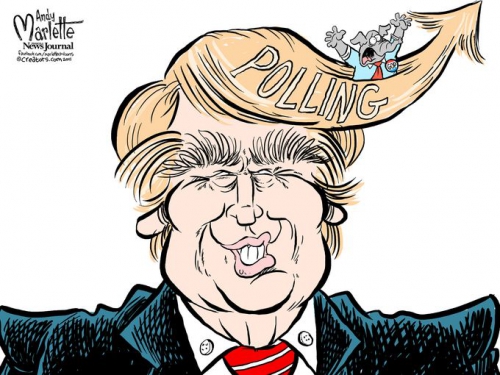
 Het heeft allemaal iets akeligs en het verwondert niet dat volgens peilingen een meerderheid van Amerikanen vindt dat de verkiezingen niet helemaal correct en eerlijk verlopen (Knack 22 oktober). Men kan er niet naast zien dat de kandidaat Trump het slachtoffer is van een soort samenzwering “die de hele elite in binnen- en buitenland” verenigt (Knack, id.). Zelfs staatsorganen als de federale recherche zijn actief in de bestrijding van de kandidaat Trump.
Het heeft allemaal iets akeligs en het verwondert niet dat volgens peilingen een meerderheid van Amerikanen vindt dat de verkiezingen niet helemaal correct en eerlijk verlopen (Knack 22 oktober). Men kan er niet naast zien dat de kandidaat Trump het slachtoffer is van een soort samenzwering “die de hele elite in binnen- en buitenland” verenigt (Knack, id.). Zelfs staatsorganen als de federale recherche zijn actief in de bestrijding van de kandidaat Trump.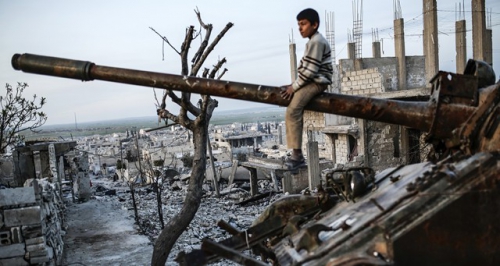
 Dans son dernier livre, Pourquoi perd-on la guerre ? Un nouvel art occidental, Gérard Chaliand cherche à comprendre comment les Occidentaux, avec la supériorité matérielle qui est la leur, n'ont cessé, depuis le Vietnam, de multiplier les échecs sur le terrain militaire et politique, alors qu'ils avaient, lors de la période coloniale qui précède, gagné l'ensemble des guerres asymétriques ou irrégulières (malgré quelques batailles perdues).
Dans son dernier livre, Pourquoi perd-on la guerre ? Un nouvel art occidental, Gérard Chaliand cherche à comprendre comment les Occidentaux, avec la supériorité matérielle qui est la leur, n'ont cessé, depuis le Vietnam, de multiplier les échecs sur le terrain militaire et politique, alors qu'ils avaient, lors de la période coloniale qui précède, gagné l'ensemble des guerres asymétriques ou irrégulières (malgré quelques batailles perdues).